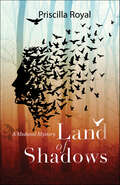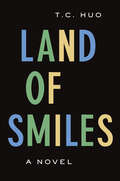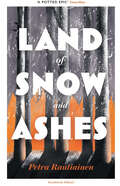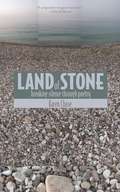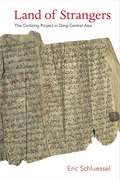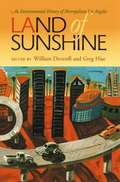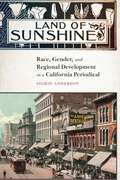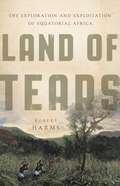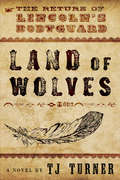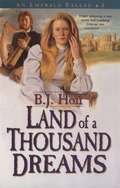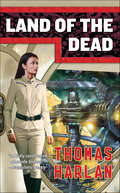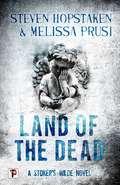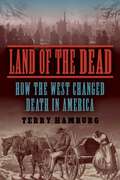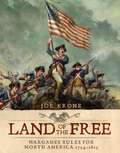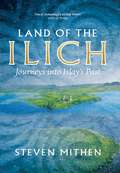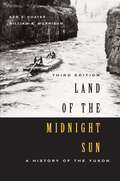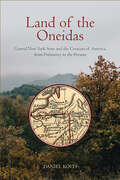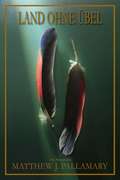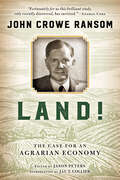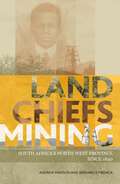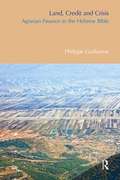- Table View
- List View
Land of Shadows (Medieval Mysteries #12)
by Priscilla Royal"Royal amplifies and deepens her series characters in the service of a clever plot that elevates her work to the top rank of historical mystery writers." —Publishers Weekly Starred Review for Satan's Lullaby, eleventh in a medieval mystery series recommended by Sharon Kay Penman and compared to Ellis Peters' Brother CadfaelsA royal birth, a nobleman's death, a scarlet woman's murder...In March 1279, Edward I takes a break from hammering the Welsh and bearing down on England's Jews to vacation in Gloucestershire. The royal party breaks the journey at Woodstock Manor. And there one life begins as Queen Eleanor labors to birth a new daughter, and one draws to an end when apoplexy fells Baron Adam Wynethorpe.Hotfoot to the baron's deathbed comes his elder son, Hugh, a veteran of Edward I's Crusades, who can't shake off the battle horrors he's witnessed. The baron's daughter, Prioress Eleanor, has already arrived, bringing along both her sub-infirmarian, Sister Anne, and the monk, Brother Thomas, to tend her father. Awaiting Hugh is his bastard son, Richard, a youth filled with rebellion…and a secret.The royal manor is packed with troubling guests including a sinister priest, an elderly Jewish mother from nearby Oxford mourning a son hanged for the treason of coin-clipping, contentious and greedy courtiers, and a lusty wife engaged with more than one lover. Quite soon, the wife is found hanged. Eleanor and Sister Anne persuade the High Sheriff of Berkshire that Mistress Hawis' death was not a suicide. In fact, many at the manor had reason to wish Hawis dead. One suspect is...Richard.
Land of Smiles: A Novel
by T. C. Huo&“A remarkable story, a courageous performance, and we're privileged to get it.&”—Los Angeles TimesSet in the 1970s, in the era of the Vietnam War and its volatile aftermath, Land of Smiles tells the story of a young Southeast Asian man's journey from a refugee camp in Thailand to a housing project in Oakland, California.The novel opens with a Laotian boy, Boontakone, who swims across the Mekong River, leaving his old life behind, and losing his mother and sister in the process. In a refugee camp in Thailand, Boontakone struggles to decipher the secret codes of his new life. Huo offers a glimpse into a world as highly ordered and dependent on proper observance of social customs and manners as any created by Jane Austen. Eventually Boontakone and his father make their way to America, where the young man will have to sort out impressions as dazzling and puzzling as the American high school, Superman, and Saturday Night Fever.Balancing a moving account of dislocation and loss with gentle comedy, Land of Smiles is a new classic in the literature of the immigrant experience.
Land of Snow and Ashes
by PETRA RAUTIAINENThe haunting, gripping story of Lapland's buried history of Nazi crimes during World War II, perfect for fans of Stolen by Ann-Helén Laestadius&“A beautifully written novel and a thriller that will keep readers turning the page to find out the truth about this disgraceful chapter of Finnish history&” – Harvard ReviewFinnish Lapland, 1944: a young soldier is called to work as an interpreter at a Nazi prison camp. Surrounded by cruelty and death, he struggles to hold onto his humanity. When peace comes, the crimes are buried beneath the snow and ice.A few years later, journalist Inkeri is assigned to investigate the rapid development of remote Western Lapland. Her real motivation is more personal: she is following a lead on her husband, who disappeared during the war. Finding a small community riven with tension and suspicious of outsiders, Inkeri slowly begins to uncover traces of disturbing facts that were never supposed to come to light.From this starkly beautiful polar landscape emerges a story of silenced histories and ongoing oppression, of human brutality and survival.
Land of Stone: Breaking Silence Through Poetry (William Beaumont Hospital Series in Speech and Language Pathology)
by Karen ChaseThe engaging autobiographical account of a poet-in-residence at a psychiatric hospital who helps a silent young man regain his speaking voice through writing poetry.
Land of Strangers: The Civilizing Project in Qing Central Asia
by Eric SchluesselAt the close of the nineteenth century, near the end of the Qing empire, Confucian revivalists from central China gained control of the Muslim-majority region of Xinjiang, or East Turkestan. There they undertook a program to transform Turkic-speaking Muslims into Chinese-speaking Confucians, seeking to bind this population and their homeland to the Chinese cultural and political realm. Instead of assimilation, divisions between communities only deepened, resulting in a profound estrangement that continues to this day.In Land of Strangers, Eric Schluessel explores this encounter between Chinese power and a Muslim society through the struggles of ordinary people in the oasis of Turpan. He follows the stories of families divided by war, women desperate to survive, children unsure where they belong, and many others to reveal the human consequences of a bloody conflict and the more insidious violence of reconstruction. Schluessel traces the emergence of new struggles around essential questions of identity, showing how religious and linguistic differences converged into ethnic labels. Reading across local archives and manuscript accounts in the Chinese and Chaghatay languages, he recasts the attempted transformation of Xinjiang as a distinctly Chinese form of colonialism. At a time when understanding the roots of the modern relationship between Uyghurs and China has taken on new urgency, Land of Strangers illuminates a crucial moment of social and cultural change in this dark period of Xinjiang’s past.
Land of Sunshine: An Environmental History of Metropolitan Los Angeles
by William Deverell Greg HiseMost people equate Los Angeles with smog, sprawl, forty suburbs in search of a city-the great "what-not-to-do" of twentieth-century city building. But there's much more to LA's story than this shallow stereotype. History shows that Los Angeles was intensely, ubiquitously planned. The consequences of that planning-the environmental history of urbanism--is one place to turn for the more complex lessons LA has to offer. Working forward from ancient times and ancient ecologies to the very recent past, Land of Sunshine is a fascinating exploration of the environmental history of greater Los Angeles. Rather than rehearsing a litany of errors or insults against nature, rather than decrying the lost opportunities of "roads not taken," these essays, by nineteen leading geologists, ecologists, and historians, instead consider the changing dynamics both of the city and of nature. In the nineteenth century, for example, "density" was considered an evil, and reformers struggled mightily to move the working poor out to areas where better sanitation and flowers and parks "made life seem worth the living. " We now call that vision "sprawl," and we struggle just as much to bring middle-class people back into the core of American cities. There's nothing natural, or inevitable, about such turns of events. It's only by paying very close attention to the ways metropolitan nature has been constructed and construed that meaningful lessons can be drawn. History matters. So here are the plants and animals of the Los Angeles basin, its rivers and watersheds. Here are the landscapes of fact and fantasy, the historical actors, events, and circumstances that have proved transformative over and over again. The result is a nuanced and rich portrait of Los Angeles that will serve planners, communities, and environmentalists as they look to the past for clues, if not blueprints, for enhancing the quality and viability of cities.
Land of Sunshine: Race, Gender, and Regional Development in a California Periodical
by Sigrid AndersonAlthough denied the right to vote, late nineteenth-century women writers engaged in debates over land settlement and expansion through literary texts in regional periodicals. In &“Land of Sunshine&”: Race, Gender, and Regional Development in a California Periodical, Sigrid Anderson uncovers the political fictions of writers Charlotte Perkins Gilman, Mary Austin, Constance Goddard DuBois, Beatriz Bellido de Luna, and Edith Eaton (Sui Sin Far), all of whom were contributors to the Southern California periodical Land of Sunshine. In this magazine, which generally touted the superiority of the West and its white settlers, women authors undercut triumphalist narratives of racial superiority and rapid development by focusing on the stories of hardship experienced by the marginalized communities displaced by white expansion. By telling stories from the points of view of marginalized peoples who had been disempowered in the political sphere and shaping those stories to offer solutions to land settlement questions, these women writers used literature to make a political point. &“Land of Sunshine&” unpacks the competing visions of Southern California embedded in this periodical while revealing the essential role of magazines in place-making.
Land of Tears: The Exploration and Exploitation of Equatorial Africa
by Robert HarmsA prizewinning historian's epic account of the scramble to control equatorial Africa In just three decades at the end of the nineteenth century, the heart of Africa was utterly transformed. Virtually closed to outsiders for centuries, by the early 1900s the rainforest of the Congo River basin was one of the most brutally exploited places on earth. In Land of Tears, historian Robert Harms reconstructs the chaotic process by which this happened. Beginning in the 1870s, traders, explorers, and empire builders from Arabia, Europe, and America moved rapidly into the region, where they pioneered a deadly trade in ivory and rubber for Western markets and in enslaved labor for the Indian Ocean rim. Imperial conquest followed close behind. Ranging from remote African villages to European diplomatic meetings to Connecticut piano-key factories, Land of Tears reveals how equatorial Africa became fully, fatefully, and tragically enmeshed within our global world.
Land of War: A History of European Warfare from Achilles to Putin
by William NesterWar in Europe began with the first human migrants. Rival bands fought for thousands of years before the Greeks and Romans began writing about their military history, first as legend—for instance, the hero Achilles battling the Trojans—and then as fact. War developed from sticks and stones to bronze, iron, and steel, including armor and edged weapons. Then came gunpowder, guns, and cannons, which eventually replaced edged weapons. Finally, in the nineteenth and twentieth centuries, technology exploded: railroads, steamships, telegraphs, machine guns, automobiles, airplanes, and tanks enabled European states to muster, equip, arm, transport, and command more men than ever before, with more firepower than ever before. In the past seventy-five years, atomic weapons changed the military landscape of Europe—as have the internet and cyber warfare. In this colorful new telling of European warfare—and indeed European history through the continent&’s all too numerous wars and conflicts—William Nester describes millennia of armed conflict. He covers the &“greatest hits&” of military history both ancient and current: Thermopylae, the Peloponnesian War, the wars of the Roman Empire across the continent, the Battle of Hastings, the Crusades, Agincourt, Waterloo, Napoleon and Wellington, the Somme, the Spanish Civil War, Stalingrad and Normandy, Churchill, Hitler, and Stalin, Bosnia, and up through Putin&’s attempts to redraw the map of Europe. Nester highlights how warfare has been deeply entwined with European statesmanship and undergirds modern institutions such as NATO and the European Union. Europe&’s sense of itself is bound up in its military history. Land of War is an epic odyssey from Europe&’s mythic origins through its latest violent conflicts.
Land of Wolves: The Return of Lincoln's Bodyguard (Lincoln's Bodyguard Series #2)
by Tj Turner"Perfect reading for fans of alternate-history adventures." —BooklistLand of Wolves finds Joseph Foster with Molly as they settle into a new-found life in the hills of Tennessee. But Abraham Lincoln's former bodyguard, the man who saved the President's life, cannot escape the Consortium as they come roaring back, killing his mother, abducting his daughter—all to coerce his Congressional testimony on their behalf.Instead, Joseph and Molly strike the Consortium in their own safe haven of New York City. In a Bonnie and Clyde-like twist, they rob from the Consortium to draw out their leader—General Dorsey. But the hidden plan reveals more than they counted on, exposing the true intention to steal the Black Hills and the gold underneath from the Lakota Sioux. Land of Wolves traverses the American landscape, where only a full reconciliation with Joseph's native heritage and a cast of characters ripped from history—including Lincoln—can bring true peace and stop General Dorsey and the evil Industrial Consortium.
Land of Wondrous Cold: The Race to Discover Antarctica and Unlock the Secrets of Its Ice
by Gillen D’Arcy WoodA gripping history of the polar continent, from the great discoveries of the nineteenth century to modern scientific breakthroughsAntarctica, the ice kingdom hosting the South Pole, looms large in the human imagination. The secrets of this vast frozen desert have long tempted explorers, but its brutal climate and glacial shores notoriously resist human intrusion. Land of Wondrous Cold tells a gripping story of the pioneering nineteenth-century voyages, when British, French, and American commanders raced to penetrate Antarctica’s glacial rim for unknown lands beyond. These intrepid Victorian explorers—James Ross, Dumont D’Urville, and Charles Wilkes—laid the foundation for our current understanding of Terra Australis Incognita.Today, the white continent poses new challenges, as scientists race to uncover Earth’s climate history, which is recorded in the south polar ice and ocean floor, and to monitor the increasing instability of the Antarctic ice cap, which threatens to inundate coastal cities worldwide. Interweaving the breakthrough research of the modern Ocean Drilling Program with the dramatic discovery tales of their Victorian forerunners, Gillen D’Arcy Wood describes Antarctica’s role in a planetary drama of plate tectonics, climate change, and species evolution stretching back more than thirty million years. An original, multifaceted portrait of the polar continent emerges, illuminating our profound connection to Antarctica in its past, present, and future incarnations.A deep-time history of monumental scale, Land of Wondrous Cold brings the remotest of worlds within close reach—an Antarctica vital to both planetary history and human fortunes.
Land of a Thousand Dreams (An Emerald Ballad Book #3)
by B. J. Hoff[from the back cover:] "In famine-ravaged Ireland, the revered poet-patriot Morgan Fitzgerald, himself brought down by a gunman's bullet, seeks to restore his ruined life and bring hope to the next generation. With the help of his mysterious West Indies companion, Sandemon, Morgan establishes a school at Nelson Hall and provides a home for the "fey Belfast orphan," Annie Delaney, and the beautiful, mute "Innocent," Finola. But when violence and tragedy strike, Morgan finds himself locked in battle with the powers of darkness--for his own future and the future of those he loves. On the other side of the ocean, Morgan's friends Michael and Nora discover that the Land of Opportunity teems with poverty, political corruption and racial tension. From the opulence of Fifth Avenue to the squalor of the slum at Five Points, the city of New York staggers under the injustice and degradation brought on by organized crime and the exploitation of the flood of immigrants pouring into the nation. Unaware that his own son Tierney has been lured into the nefarious schemes of Patrick Walsh, Michael vows to bring Walsh to ruin--and may bring down Tierney in the process. In Land of a Thousand Dreams, award-winning author B.J. Hoff continues to spin the unforgettable drama of Ireland's battle to survive--both on the Emerald Isle and in the streets of the New World. Their faith is strong, but will the dreams of a better life prevail?" Bookshare has the entire exciting, romantic, historic and dramatic Emerald Ballad series including Book #1 Song of the Silent Harp, Book #2, Heart of the Lonely Exile, #4 Sons of an Ancient Glory, and #5 Dawn of the Golden Promise.
Land of the Dead (In The Time of The Sixth Sun #3)
by Thomas HarlanIt's a small change in our history: imagine that the Japanese made contact with the Aztec Empire. Instead of small-pox and Christianity, they brought an Imperial alliance, samurai ethics, and technology. By the time of these books, the Emperor in Mexico City rules not just the entire planet Earth, but a growing interplanetary Empire. But the Galaxy is not a hospitable place, and there are other powers, both new and very very old, who would stop the spread of the power in Anuhuac.A weapon of the Old Ones, from the time of the First Sun, has been found in a region of space. It must be investigated, then tamed or destroyed to keep it from the hands of opposing powers. Gretchen Anderssen, freelance archeologist and specialist in First Sun artifacts, has been hired by her old mentor Green Hummingbird, agent of the Mirror Service, to join him in the study. They will be joined by old friends, and some old enemies as well.At the Publisher's request, this title is being sold without Digital Rights Management Software (DRM) applied.
Land of the Dead: A Stoker's Wilde Novel (Stoker's Wilde)
by Steven Hopstaken Melissa PrusiBram Stoker and Oscar Wilde unite once more to battle spirits and demons invading our world. Third book in the series. Grimdark Magazine called the first book an "addictive, clever and extremely fun horror adventure." Book 3 in the Stoker's Wilde series!Booklist on the first book in this series, Stoker's Wilde: "Pass this volume on to readers who are hungry for more historical stories with a supernatural frame." Science and the supernatural collide in this terrifying tale of witches, reanimated corpses and spirits invading our world from beyond the grave. Bram Stoker and Oscar Wilde have returned to their lives in London after their adventures in the American West. Bram is managing a theatre and Oscar is rising to fame and planning his upcoming wedding when they are once again called upon to battle supernatural evil. Grief-crazed scientist Victor Mueller needs Bram&’s unusual blood for his mad quest to bring his dead wife back to life, and he&’ll resort to kidnapping to get it. Meanwhile, a young medium named Lorna Bow runs fake séances in London under the thumb of an abusive uncle. When her mother Endora returns, Lorna learns the truth: they come from a long line of witches, and soon Endora has awakened Lorna&’s dormant powers. When the scientist and the witches combine forces, all Hell breaks loose. Long-dead souls find themselves back in the land of the living, and some of them have scores to settle with our heroes. But as Mueller&’s ambition and her mother&’s desire for vengeance against the men who imprisoned her become clear, Lorna soon finds herself questioning the morality of their work.Bram and Oscar must team up with American secret agent Cora Chase to protect all they hold dear. Only a mission into the Land of the Dead can stop Mueller and Endora from bringing back more souls. Bram&’s wife Florence must call on the monster-fighting skills she honed in America, and even Oscar&’s bride Constance has to face new challenges as she learns how the supernatural has shaped her own history. In an adventure that spans continents – and even other worlds – they confront old enemies and unknown dangers. Teaming up with old friends Teddy Roosevelt and Richard Burton and new allies like Arthur Conan Doyle and Nicola Tesla, they too must harness both science and magic to protect our world from intruders from the Land of the Dead.FLAME TREE PRESS is the imprint of long-standing independent Flame Tree Publishing, dedicated to full-length original fiction in the horror and suspense, science fiction & fantasy, and crime / mystery / thriller categories. The list brings together fantastic new authors and the more established; the award winners, and exciting, original voices. Learn more about Flame Tree Press at www.flametreepress.com and connect on social media @FlameTreePress
Land of the Dead: How the West Changed Death in America
by Terry HamburgThe fabled nineteenth-century migration to the American West was filled with peril and despair. From sailing ship to covered wagon, ambitious young pioneers endured six months of unprecedented, largely unanticipated personal hardship – that is, if they survived the trip. Death was a constant companion and the promised land proved as lethal as it was fickle. Land of the Dead explores how the demands of survival and adaptation during Westward Expansion changed the way we have buried and grieved for our dead in America. That custom was one of many transformations an outlier adolescent culture wrought upon the nation that spawned it.Nowhere did these changes play out more dynamically than in California, particularly in the quintessential American boom city - gold rush San Francisco, which banned burials at the turn of the twentieth century and then decreed the removal of 150,000 privately owned graves, the only major metropolis to execute a complete eviction of its dead. The epic cemetery battle began early, when San Francisco was still a remote, wannabe great city, and raged on for over half a century, replete with fiery polemics, political intrigue, nasty legal wrangling, and divisive elections. Public cemeteries were dispatched quickly but – as time will reveal – hardly well. Private sanctuaries took longer to expunge, and many of its &“residents&” were overlooked in what has been called &“the greatest mass removal of the dead in human history.&” How could the unthinkable happen? And how did other American cities reckon with the now-precious land once dedicated to their dead.In this well-researched and well-told history, Terry Hamburg explores how an &“instant city&” heritage bred that momentous decision and led to the formation of nearby Colma – the largest necropolis in America. Providing a fresh overlay on traditional narratives and revealing a burgeoning nation&’s trends and conflicts, Land of the Dead examines how we relate to our &‘living dead&’ then and now.
Land of the Firebird: The Beauty of Old Russia
by Suzanne MassieThe Russians have valued humility rather than pride. They have approached God in a spirit of meekness; they have loved nature. They have revered poets and poetry with a passion equaled by few other peoples, and have produced a poetic literature of extraordinary richness and variety. Their knowledge of suffering and their understanding of human weakness have made their 19th-century novels probably the greatest in world literature. They gave depth and feeling to formal movements and divertissements intended only for the aristocracy of Europe and turned ballet into an uplifting and popular art, one that is particularly modern.
Land of the Free
by Joe KroneThis set of rules allows players to start with small warbands of 10-20 miniatures of any scale and develop their forces over time, building them up into armies of hundreds of models! No matter the size of a player's collection, these rules will provide an enjoyable game. England and France set upon the New World with a fury, building settlements whenever they could hack a clearing out of the wilderness. Expansion brought them into contact with the natives, with whom they established trade and commerce. The New World was vast but not nearly big enough for the ambitions of these powers and conflict was inevitable. In Europe they call it the Seven Years' War, but in the New World the French and Indian War was fought for dominance over this new land. Nine long years of bloodshed saw England triumphant, but the war had placed great burdens upon colonist and King alike. Tariffs were created to pay for the war but the newly formed colonies quickly realized they were being treated unfairly. "No taxation without representation" became the rallying cry and a cultural revolution ignited into full rebellion. The American Revolution birthed a new nation that faced trials from the very beginning, not least a new conflict against England - the War of 1812. After nearly three years of warfare, the young nation stood strong and started down the road to becoming a new world power.Each player will build their forces using a unique system of command points. Throughout the game these command points will be used to perform actions, resolve morale tests, and reduce the enemy's will to fight. Resource management is determining what command points will be used for which elements and which actions. Risk management is evaluating whether you should extend your command point resources at the danger or exhausting your army and making them susceptible to counter-attack. Victory is determined by who holds the field of battle and which objectives were achieved.
Land of the Ilich: Journey's into Islay's Past
by Steven MithenAs an archaeologist, Steven Mithen has worked on the Hebridean island of Islay over a period of many years. In this book he introduces the sites and monuments and tells the story of the island’s people from the earliest stone age hunter-gatherers to those who lived in townships and in the grandeur of Islay House. He visits the tombs of Neolithic farmers, forts of Iron Age chiefs and castles of medieval warlords, discovers where Bronze Age gold was found, treacherous plots were made against the Scottish crown, and explores the island of today, which was forged more recently by those who mined for lead, grew flax, fished for herring and distilled whisky – the industry for which the island is best known today. Although an island history, this is far from an insular story: Islay has always been at a cultural crossroads, receiving a constant influx of new people and new ideas, making it a microcosm for the story of Scotland, Britain and beyond.
Land of the Midnight Sun, Third Edition: A History of the Yukon (Carleton Library Series #202)
by Ken S. Coates<p>While the Klondike Gold Rush is one of the most widely known events in Canadian history, particularly outside Canada, the rest of the Yukon’s long and diverse history attracts little attention. Important developments such as Herschel Island whaling, pre-1900 fur trading, the post-Second World War resource boom, a lengthy struggle for responsible government, and the emergence of Indigenous political protest remain poorly understood. <p>Placing well-known historical episodes within the broader sweep of the past, Land of the Midnight Sun gives particular emphasis to the role of First Nations people and the lengthy struggle of Yukoners to find their place within Confederation. This broader story incorporates the introduction of mammoth dredges that scoured the Klondike creeks, the impressive Elsa-Keno Hill silver mines, the impact of residential schools on Aboriginal children, the devastation caused by the sinking of the Princess Sophia, the Yukon’s remarkable contributions to the national First World War effort, and the sweeping transformations associated with the American occupation during the Second World War. <p>Land of the Midnight Sun has long been the standard source for understanding the history of the territory. This third edition includes a new preface to update readers on developments in the Yukon’s economy, culture, and politics, including Indigenous self-government.</p>
Land of the Oneidas: Central New York State and the Creation of America, from Prehistory to the Present
by Daniel KochThe central part of New York State, the homeland of the Oneida Haudenosaunee people, helped shape American history. This book tells the story of the land and the people who made their homes there from its earliest habitation to the present day. It examines this region's impact on the making of America, from its strategic importance in the Revolution and Early Republic to its symbolic significance now to a nation grappling with challenges rooted deep in its history. The book shows that in central New York—perhaps more than in any other region in the United States—the past has never remained neatly in the past. Land of the Oneidas is the first book in eighty years that tells the history of this region as it changed from century to century and into our own time.
Land ohne Übel
by Annika Mirwald Matthew J. PallamaryEin historischer Roman über den Konflikt zwischen den Jesuiten und den Guarani-Indianern Paraguays und deren Suche nach dem mystischen Land ohne Übel, erzählt aus der Perspektive der Eingeborenen Reisen Sie 250 Jahre zurück in die Vergangenheit, in eine längst vergessene Welt, wo die Natur durch ihre Pflanzen spricht und der Gesang der rauschenden Wasserfälle atemberaubender klingt als das Ave Maria in der Kirche. Ein Ort, an dem der Rhythmus einer gefiederten Rassel angeblich die Macht besitzt, eine Verbindung zwischen ihrem Besitzer und den Göttern herzustellen. Eine Welt, in der Mystik und angeborene Spiritualität in Konflikt mit dem christlichen Glauben stehen. Avá-Tapé, aufgewachsen mit den Traditionen der Guarani-Indianer Südamerikas und später unterrichtet von den Jesuiten, erkennt die Wahrheit und Schönheit beider Welten, kann jedoch nur in einer von ihnen leben. Sowohl die Jesuiten wie auch sein Vater, Avá-Nembiará, der Schamane seines Volkes, erwarten von ihm absolute Loyalität, und so muss Avá-Tapé eine Entscheidung treffen. Schamanentum, religiöser Fanatismus, Geschichte, Imperialismus, Erwachsenwerden und eine rührende Liebesgeschichte prägen diese nachdenklich stimmende Erzählung über den Untergang und doch letztendlichen Triumph eines Naturvolkes und dessen Traditionen. Avá-Tapé, beflügelt sowohl von der physischen wie auch spirituellen Suche, seiner Ergebenheit gegenüber seinem Volk wie auch seiner Liebe zu der bezaubernden Kuná-Mainó, wird zum größten aller Schamanen und wagt den Versuch, seinen Stamm zum mystischen LAND OHNE ÜBEL zu führen. Mit einer Sprachgewandtheit, die sowohl die Essenz als auch die Seele der Guarani-Kultur einfängt, entführt Pallamary seine Leser in eine längst vergessene Welt, die zu erforschen sich lohnt, in eine Spiritualität, die sich über jegliches religiöses Dogma erhebt und stattdessen Verständnis und Hoffnung weckt. LAND OHNE ÜBEL ist nicht
Land or Death: The Peasant Struggle in Peru
by Hugo Blanco"LAND OR DEATH," says Peter Camejo in his introduction, "constitutes one of the most significant contributions to the theory and practice of Latin American revolution since the Cuban Revolution." It not only describes the conditions of peasant life, but tells the fascinating story of thousands of Quechua Indians who began to take back the lands stolen from them. Drawing on his experience as a leading figure in this mass peasant movement, Blanco takes issue with those who believe the revolution in Latin America can come through either elections or small groups of dedicated, but isolated, guerrillas. Hugo Blanco, a principal organizer of the peasant movement in Peru, was sentenced to a twenty-five year prison term for his activities. Written from inside the famous El Fronton Island prison, Land or Death illustrates Blanco's refusal to be silenced by the government. Blanco was freed in 1970 under the pressure of an international campaign.
Land!: The Case for an Agrarian Economy
by John Crowe RansomFrom a National Book Award winner, &“an indictment of a system that values accumulation, shareholder profit . . . over . . . self-sufficiency, and solidarity.&” (Robert Neuwirth, author of Stealth of Nations: The Global Rise of the Informal Economy) John Crowe Ransom's Land! is a previously unpublished work that unites the accomplished literary scholar&’s poetic sensibilities with an examination of economics at the height of the Great Depression. Politically charged with Ransom's aesthetic beliefs about literature and his agrarian interpretation of economics, Land! was long thought to have been burned by its author after he failed to find a publisher. Thankfully, the manuscript was discovered, and we are now able to read this unique and interesting contribution to the Southern Agrarian revival. After the publication of the Agrarian movement manifesto I&’ll Take My Stand in 1930, Ransom, a contributor, became convinced that the book had not adequately proposed an economic alternative to Northern industrialism, which had fairly obliterated the Southern way of life. Land! was Ransom's attempt to fill this gap. In it he presents the weaknesses inherent in capitalism and proposes instead that agrarianism, which could flourish alongside capitalism, would relieve the problems of unemployment. America, Ransom claims, is unique in offering this opportunity because, unlike in European countries, land is plentiful. &“Ransom joins Lauck in championing the values fostered by rural and small-town America. Is this just wishful thinking? Perhaps, and yet don&’t we sometimes need to step back before we can leap forward?&” —The Washington Post &“Ransom&’s affection for traditional rural culture provides an enjoyable warm streak in the book.&” —Choice &“Mr. Ransom&’s highly original argument unfolds in beautifully written prose. . . . engaging and thought-provoking.&” —George Core, retired editor of The Sewanee Review
Land, Chiefs, Mining: South Africa's North West Province since 1840
by Andrew Manson Bernard MbengaLand, Chiefs, Mining explores aspects of the experience of the Batswana in the thornveld and bushveld regions of the North-West Province, shedding light on defi ning issues, moments and individuals in this lesser known region of South Africa. Some of the focuses are: an important Tswana kgosi (chief ), Moiloa II of the Bahurutshe; responses to and participation in the South African War and its aftermath, 1899-1907; land acquisition; economic and political conditions in the reserves; resistance to Mangope’s Bophuthatswana; the impact of game parks and the Sun City resort; rural resistance and the liberation struggle; and African reaction to the platinum mining revolution. Written in a direct and accessible style, and illustrated with photographs and maps, the book provides an understanding, for a general reader ship, of the region and its recent history. At the same time it opens up avenues for further research. The authors, Andrew Manson and Bernard Mbenga, both based at North-West University, Mahikeng Campus, have, for some thirty years, been studying and writing on the region’s past.
Land, Credit and Crisis: Agrarian Finance in the Hebrew Bible (BibleWorld)
by Philippe GuillaumeLand, Credit and Crisis presents a new understanding of the financial culture of the Bible. Biblical Palestine was characterized by an over-abundance of arable land combined with a chronic lack of manpower and agricultural credit - circumstances which lead to much prophetic fulminating against merchants and the rich. The book reveals how the financial instruments and institutions of the time reflected a tough economic realism and argues that the image of the biblical prophet as a champion of social justice must be revised.
